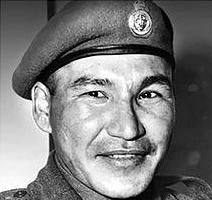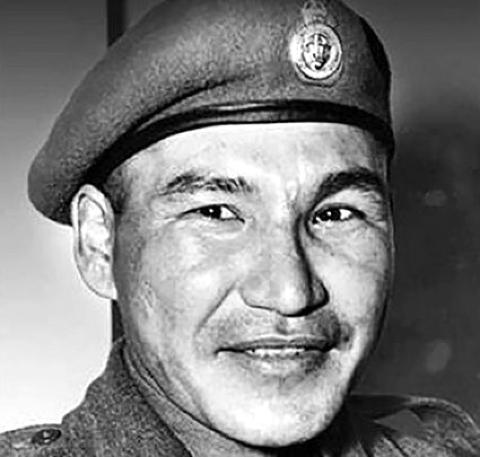 |
Canku Ota
|
 |
|
(Many Paths)
|
||
|
An Online Newsletter
Celebrating Native America
|
||
|
July 2020 - Volume 18
Number 7
|
||
|
|
||
|
Sergeant Tommy Prince,
Ojibway War Hero May Be New Face Of Canada's $5 Bill
|
||
|
by Indian Time
|
||
Sgt. Tommy Prince's life exemplifies both incredible bravery and the persistent racism faced by Indigenous people. Canada's most decorated Indigenous war veteran, Sgt. Tommy Prince, deserves to be the face of the new $5 bill, say Manitoba's Conservative MPs. Prince's life exemplifies both incredible sacrifice and bravery and the persistent racism faced by Indigenous people in Canada, said Sen. Donald Plett and eight MPs, including Conservative House leader Candice Bergen and National Defence critic James Bezan, in a letter sent to the Minister of Finance. Prince earned 11 medals in the Second World War and the Korean War and was one of three Canadians to receive both the American Silver Star and the Military Medal, presented by King George VI at Buckingham Palace in 1945. When Prince returned to his home province of Manitoba, he endured discrimination, poverty and illness and died while living in a Winnipeg shelter at the age of 62. The Bank of Canada is in the process of selecting a new face for the $5 note, which currently features former prime minister Wilfred Laurier. Close to 45,000 people submitted suggestions and the bank's advisory council is reviewing more than 600 historical candidates for a short list. It expects the new bills to begin circulating in a few years. The bank followed a similar process when it chose human rights icon Viola Desmond for the $10 bill in 2016. Prince was born in 1915 and lived on the Brokenhead Reserve of the Ojibway Nation in Manitoba. At the age of five, Prince was forced to attend Elkhorn Residential School. During the Second World War, Prince served in the elite Devil's Brigade, scouting deep behind German lines to collect critical intelligence. In Italy in 1944, Prince spied on the Germans from an abandoned farmhouse, with 1,400 metres of telephone wire connecting him to the Allies, according to Veterans Affairs. At one point during a 24-hour solo watch, the phone line was cut by shelling. Dressed like a farmer, Prince wielded a hoe, and pretended to weed his crops in full view of German soldiers until he located the damaged line and repaired it. He continued reporting on the location of German artillery, and all four positions were destroyed. "Sergeant Prince's courage and utter disregard for personal safety were an inspiration to his fellows and marked credit to his unit," said a citation for a medal he later received. Later that year, Prince was scouting in southern France when he located German gun sites and an encampment. He hiked 70 kilometers through mountainous terrain to share the information. He led his brigade back and joined the ensuing battle that successfully pushed the enemy out of the area. When Prince returned to Canada, he became a spokesperson for the Manitoba Indian Association, advocating for the abolition of the Indian Act and for better schools and living conditions as well as expanded hunting, trapping and fishing rights.
"Indigenous Canadians, like Sergeant Prince, came back from war with the self-confidence and desire to speak for themselves and make change," said the letter sent by Conservative MPs. "They were prepared to reconcile with Canada and move forward on the path of reconciliation, but Canada was not." The vast majority of Indigenous people, including more than 15,000 Indigenous soldiers who fought in the Second World War and Korean War, weren't allowed to vote until 1960. They were also denied the veteran benefits received by their white counterparts, including land, grants and vocational training. Prince spent the last decades of his life in Winnipeg, likely suffering from post-traumatic stress disorder from his years of service. His five children were placed in foster care. He died in 1977 while staying in a small room at the Salvation Army's shelter. |
||||
|
|
|
|
||
|
|
||
| Canku Ota is a free Newsletter celebrating Native America, its traditions and accomplishments . We do not provide subscriber or visitor names to anyone. Some articles presented in Canku Ota may contain copyright material. We have received appropriate permissions for republishing any articles. Material appearing here is distributed without profit or monetary gain to those who have expressed an interest. This is in accordance with Title 17 U.S.C. Section 107. | ||
|
Canku Ota is a copyright ©
2000 - 2020 of Vicki Williams Barry and Paul Barry.
|
||
 |
 |
|
|
The "Canku
Ota - A Newsletter Celebrating Native America" web site and
its design is the
|
||
|
Copyright ©
1999 - 2020 of Paul C. Barry.
|
||
|
All Rights Reserved.
|
||

